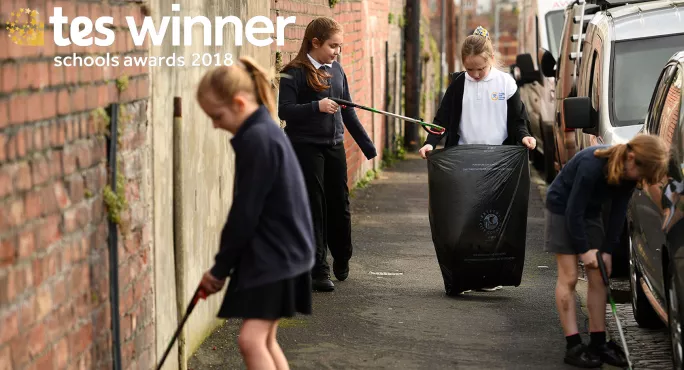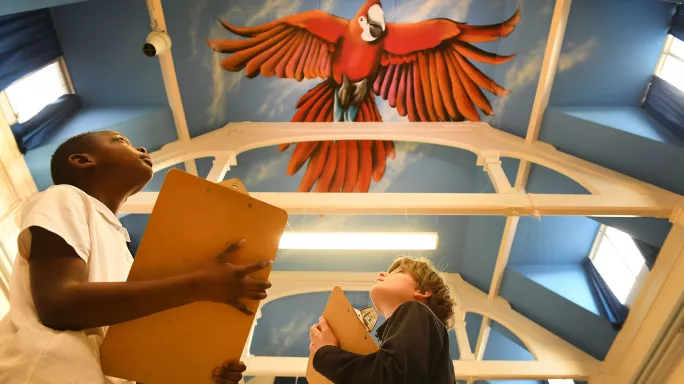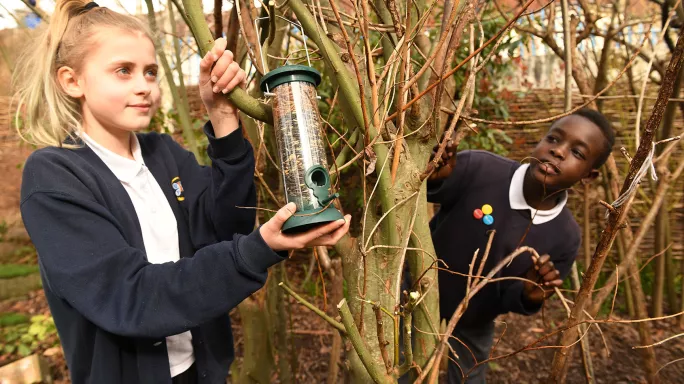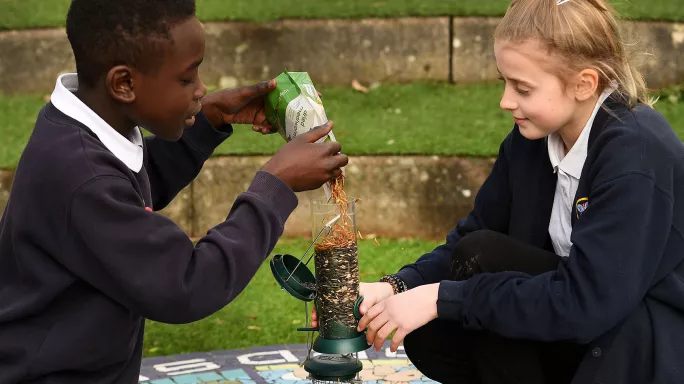- Home
- How a primary on a traffic island became the greenest school
How a primary on a traffic island became the greenest school

On the face of it, Victoria Park Primary in Bedminster is not the most promising location to build a green school.
It occupies a concrete triangle in inner-city Bristol - “a little traffic island in the middle of loads of houses”, as the school’s headteacher, Nicholas Bailey, puts it.
But first impressions can be deceptive. If you walk around Victoria Park, you soon get the sense that something rather special is going on.
Quick read: Meet the UK pupils striking against climate change
Watch: Five tips to help your school become more sustainable
Long read: Pen Green, Tes school of the year
Paintings of animals dance across the walls. On the ceiling of the school hall, an enormous scarlet macaw spreads its wings. Outside you’ll find a chicken coop, raised plant beds, and a multi-coloured mosaic featuring a line from William Wordsworth: ‘LET NATURE BE YOUR TEACHER’.
Victoria Park was the winner of the sustainable schools award at the 2018 Tes Schools Awards. The judges described it as an “amazing” primary, which “takes a whole-school approach to sustainability… not just a few activities”. (Read Victoria Park’s five tips for becoming a sustainable school here.)
We’ll come to the work Victoria Park is doing shortly. But first, it’s worth winding the clock back to understand how it all began.

‘We don’t have any green space here’
Victoria Park’s journey to becoming a sustainable school started with one teacher, Eleanor Walker, who joined the school 12 years ago.
Walker credits her own love of nature to an outdoorsy childhood. “I spent a lot of time camping out around Britain, Lake District, Yorkshire Dales, places like that,” she says. “I guess that trickles into you; becomes part of your make-up eventually.”
Prior to becoming a teacher, she worked as a park ranger in Cheltenham. “I did lots of environmental education events in the park. I’d always thought about teaching and I got to the point where I wondered if I could amalgamate the two.”
When she arrived at Victoria Park, her passion was given new force by the reality of the school environment which confronted her. “A lot of the children don’t have the same experience I did growing up,” she says. “They don’t go out to the countryside - we don’t have any green space here, we’re just like a little concrete triangle.”
Walker started small. “I was teaching in Year 5 at the time about mountains, so I asked the head if I could take them up a mountain.” The school’s mountain residential in Abergavenny was born.
The green shoots spread from there, and now sustainability and an appreciation of the natural world permeates practically every aspect of school life. When you cross the playground at Victoria Park during a breaktime, you’ll see children playing with an assortment of unexpected objects including tyres, suitcases and old-fashioned phone sets. They’re all from Children’s Scrapstore - a local charity that takes scrap materials, ensures they are safe, and then makes them available for schools who want creative play opportunities.
Each class elects two ‘eco reps’, who remind the other children to switch off lights and turn off taps. The pupils run a weekly shoe swap, where parents can swap shoes their children have grown out of and buy a pre-loved pair for £1. The money raised from the scheme is used to buy bird feeders and bird food, which have brought blackbirds and blue tits to Victoria Park’s outdoor classroom.
The school is constantly looking for opportunities to cut waste and become more environmentally friendly. It recently overhauled its procurement of cleaning products to cut down on chemical use. Milk waste has also come under its crosshairs. “We used to get milk cartons for the kids… but we were having so much waste because they didn’t all drink it all,” Walker says. “Every week we were chucking away loads and loads.” The school has changed to four-pint bottles and little cups, with the children “washing up their own cups and helping to serve it”.

The ‘green team’
Much of Victoria Park’s sustainability work is coordinated by the “green team” - a group of pupils who Walker says are a “force to be reckoned with”. As well as doing litter picks of the local community, they produce posters, deliver assemblies and mentor younger children on topics like the importance of saving energy.
The fact that a school like Victoria Park is located in Bristol is probably not a coincidence. “It’s quite an edgy place in terms of eco-activism,” Walker admits. “People are willing to get up and be counted, and to do stuff.” There’s no shortage of local charities who are knocking down the door to work with the school, from Incredible Edible, an organisation that plants up small spaces in the city with edible food, to Fare Share, which fights hunger and food waste.
But though Victoria Park might be fortunate to swim with the tide of environmental concern in Bristol, the school’s focus on sustainability is still exceptional. “I have to say that knowing a lot of the schools in the local area, it is really, really unique,” says Bailey. “I don’t know of this approach anywhere else.”
Bailey only took over as head in September, but he had done some leadership coaching at the school prior to that. He still remembers his surprise when he first received a list of the school’s subject leads. Looking down the list, he saw the English lead, the maths lead, the science lead - so far so normal. Then he saw the ‘eco-schools lead’. “It stuck out because it is unusual to have that given the same status as the core curriculum subjects.”
One of Victoria Park’s lessons to other schools wishing to emulate its approach is to embed sustainability in the curriculum. Bailey says that if sustainability was just treated as a “bolt-on”, “there wouldn’t be time for it” in the face of competing demands on teachers’ time. The trick, he says, is to weave it into every aspect of the curriculum. In Year 4, pupils learn about chocolate, which gives them an opportunity to learn about Fair Trade too. When they study rocks and fossils, they look at fossil fuels. In Year 5 they do a rainforest topic, which allows them to learn about conservation in Brazil.
The school believes their approach goes with the grain of Ofsted’s new inspection framework, which aims to shift the emphasis away from narrow exam outcomes and towards a broad and balanced curriculum. “If you’re an eco-school, that’s about as real world as it gets,” says Walker. “It’s not about a made-up thing - it’s the real world and kids can see it everywhere and they can do something about it.”
As well as taking a cross-curricular approach, another piece of advice from Victoria Park is to harness the energy of pupils. “They’re so enthusiastic the kids, they’re just amazing, and some of them are so knowledgeable, they know more than I do about stuff!”, Walker says with a laugh. She has seen the positive impact on children’s self-esteem. “I’ve seen a lot of really incredible confidence building in the kids who start with us,” she says.
Bailey believes that children can be the catalyst for breaking down the ingrained attitudes and habits of adults. “If you want to get a strong message to the parents, you go via the children,” he says. At Victoria Park, parents have taken up the baton from their children. When parents raised concerns about car exhaust fumes, the school installed two air quality sensors on the school site. It is currently collecting baseline survey data from parents to monitor the amount of time spent idling in cars, with the aim of hopefully cutting it.

‘These aren’t choices but necessities’
Of course, it can’t be done through pupil passion alone. Victoria Park is clearly extremely lucky to have Walker - a one-woman sustainability machine, whose head is brimming with useful contacts and new ideas. “You need a champion,” Bailey says simply. For her own part, the self-effacing Walker says it’s all about “being a yes person”; open to trying new things, “not just going over and pointing out ‘no that’s too dangerous’, or ‘we don’t have the staff’”. Support from school leadership is crucial too. “I know some schools where the head is really not engaged,” she says. “There are teaching assistants just running their green team in their own lunchtime without any support, and that’s quite heartbreaking.”
Sustainability is rising up the public agenda, with young people leading the way. Greta Thurnberg, the Swedish schoolgirl who inspired pupils around the world to “strike” against climate change, has been nominated for the Nobel Peace Prize. Pupils in the UK have joined the strikes, which have divided teacher opinion. Walker admits she’s agonised about the issue, and is “on the fence”. “It’s difficult, because you know that children need to be in school,” she says. But she also felt “buoyed up” that pupils were taking a stand. “They’re much more aware than my generation… part of my drive for this is that kids have to be aware, they have to understand their impact, because our generation and the one before didn’t.” She has a good reason for not going to the protests herself: “I’m confident that our school is doing it from the inside.”
As the consequences of how we have chosen to live catches up with us, Bailey thinks that what Victoria Park is doing is no longer optional.
“I don’t think there’s anyone in education who would argue with the fact that we need to prepare children for their next stage,” he says.
“These children are going to be adults in a world where these aren’t choices but necessities. If we’re not preparing them for that, then in that respect we’re failing them.”
Keep reading for just £1 per month
You've reached your limit of free articles this month. Subscribe for £1 per month for three months and get:
- Unlimited access to all Tes magazine content
- Exclusive subscriber-only stories
- Award-winning email newsletters



